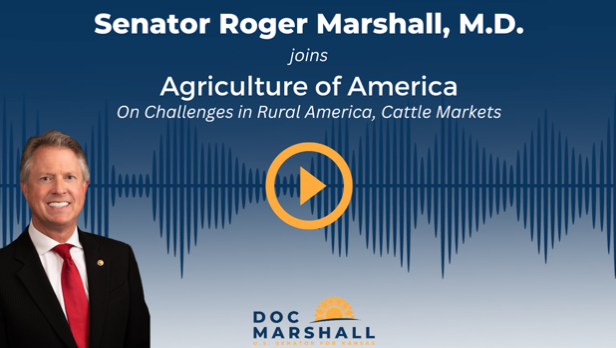ICYMI: Senator Marshall Joins Agriculture Of America: “Agriculture has Never Been a Priority for this White House”
Washington, D.C. – U.S. Senator Roger Marshall, M.D. joined Sirius XM Rural Radio, Agriculture of America to discuss his EATS Act legislation and provide an update on the Farm Bill. Senator Marshall also listed the litany of ways that Joe Biden has declared war on American Agriculture since his first day in office.

You may click HERE or on the image above to listen to Senator Marshall’s full interview.
Highlights from his interview include:
On the Farm Bill:
“Agriculture has just never been a priority for this particular White House. And I think the Farm Bill is a great example of it. We can spend hundreds of billions of dollars all across the country across the world, but there’s not time to fix a Farm Bill? ”
“I’m gonna start by thanking speaker Mike Johnson for getting the current Farm Bill extended. And I’m afraid your listeners will like the current extension better than what we’re facing in a new Farm Bill. So we’re pretty far apart. Obviously the Democrats’ efforts are always centered around the food stamp programs, we think a Farm Bill should be centered around the American farmer and making sure that we have, you know, good price points for whether it’s wheat or corn… I think it comes down to money right now. And right now this Farm Bill that we’re facing right now is just strictly a nutrition bill. And it’s not enough for the farmer.”
On being able to fund the Farm Bill:
“I mean, in many cases, I feel like I’m part of a company that’s broke. And that’s because we are, that we’re going to spend $900 billion on interest this year, $900 billion on interest, that’s more than what we’re spending on the military. So just like any business, when you start paying the banker too much, there’s no money left at home.”
“For the nutrition programs, Pat Roberts’ Farm Bill from 2018, they budgeted $60 billion a year, but we’re spending $180 billion a year on food stamps, the nutrition programs, and of course, I want everyone to eat, I don’t want anyone to go home hungry, but my goodness to go from $60 to $180 billion a year.”
“You know, just to be frank, we need folks to go back to work. And I think that’s a good thing, by the way, is to have a job and contributing to society. So the food stamp program, the nutrition programs have just broken the bank on this one.”
On the Farm Bill and interest rates:
“We spent hours and hours, weeks and weeks up here talking about these one-off government programs. But the number one thing the White House could do for the American farmer is to get the interest rates back down where they were when they took office, that you know the average American farmer maybe has a million dollar operation loan each year.”
“And they were paying 2%, now they’re paying 9% interest on that. You can do the math, but that’s $70,000 more a year in interest that those folks are spending and guess what the average income for a farmer was prior to this President, it was about $70,000.”
“So with interest rates that high even with a good Farm Bill, it’s going to be hard for farmers to make it work right now. So and then you throw in the prices of diesel and fertilizers, which have also gone up. Those are the real problems the American farmers face and the farm bill should be a help. It allows the farmer to plant next year’s crops but really those interest rates and energy costs for diesel and for fertilizers are still the number one and two problems that American agriculture is facing now.”
On Senator Marshall’s EATS Act:
“The EATS ACT was in response to California’s Proposition 12 Act, which was really an animal welfare and animal rights activists are the ones that push that through, that California wants to tell Kansas producers how to raise hogs.”
“If we let them tell us how to raise hogs, they’re going to next tell us how to raise chickens, and they’re trying to do that, they’re going to tell us how to raise cattle, they’re going to tell us what type of fertilizer we can put on our wheat as well.”
“So to me, it’s protecting Kansas’ state rights, it’s protecting the rights of our farmers to be able to produce what we do in the way we think is best. And to combat this, I just challenge your listeners, make sure that we’re sharing with everybody we can, how much we care about animals. That’s really what this comes down to.”
